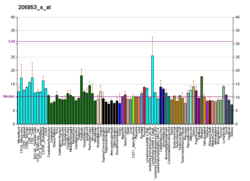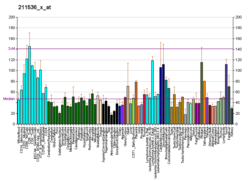MAP3K7 (mitogen-activated protein kinase kinase kinase 7)またはTAK1 (TGF-beta activated kinase 1)は、ヒトではMAP3K7 遺伝子 にコードされる酵素 である[ 5]
MAP3K7 遺伝子にコードされるMAP3K7タンパク質は、セリン/スレオニンキナーゼ ファミリーの一員である。このキナーゼはTGF-β やBMP によって誘導されるシグナル伝達を媒介し、転写 調節やアポトーシス などさまざまな細胞機能を制御する。MAP3K7は細胞死の中心的な調節因子であり、細胞内外の多様な刺激によって活性化される。MAP3K7はNF-κB 依存的経路だけでなく、酸化ストレス やRIPK1 活性依存的経路など、NF-κB非依存的経路も介して細胞生存を調節する[ 6] IL-1 に応答し、TRAF6 (英語版 ) MAP3K7IP1/TAB1 (英語版 ) MAP3K7IP2/TAB2 (英語版 ) MAPK8 (英語版 ) JNK 、MAP2K4 (英語版 ) アイソフォーム をコードする4種類の選択的スプライシング バリアントが報告されている[ 7]
TAK1は、TNF など下流のサイトカイン の発現を調節することも示されている。このTNF調節機能のため、自己免疫疾患 (関節リウマチ 、全身性エリテマトーデス 、炎症性腸疾患 )などTNFを介した疾患や、慢性疼痛 やがん など他のサイトカインを介した疾患に対する治療の新規標的となっている[ 8] コラーゲン誘導関節炎 (英語版 ) [ 9] [ 10]
MAP3K7は次に挙げる因子と相互作用することが示されている。
^ a b c GRCh38: Ensembl release 89: ENSG00000135341 - Ensembl , May 2017
^ a b c GRCm38: Ensembl release 89: ENSMUSG00000028284 - Ensembl , May 2017
^ Human PubMed Reference: ^ Mouse PubMed Reference: ^ Kondo, M.; Osada, H.; Uchida, K.; Yanagisawa, K.; Masuda, A.; Takagi, K.; Takahashi, T.; Takahashi, T. (1998-02-09). “Molecular cloning of human TAK1 and its mutational analysis in human lung cancer” . International Journal of Cancer 75 (4): 559–563. doi :10.1002/(sici)1097-0215(19980209)75:4<559::aid-ijc11>3.0.co;2-4 . ISSN 0020-7136 . PMID 9466656 . https://pubmed.ncbi.nlm.nih.gov/9466656 . ^ Mihaly, S. R.; Ninomiya-Tsuji, J.; Morioka, S. (2014-11). “TAK1 control of cell death” . Cell Death and Differentiation 21 (11): 1667–1676. doi :10.1038/cdd.2014.123 . ISSN 1476-5403 . PMC 4211365 . PMID 25146924 . https://pubmed.ncbi.nlm.nih.gov/25146924 . ^ “MAP3K7 mitogen-activated protein kinase kinase kinase 7 [Homo sapiens (human) - Gene - NCBI]”. www.ncbi.nlm.nih.gov . 2022年11月19日 閲覧。 ^ Scarneo, Scott A.; Yang, Kelly W.; Roques, Jose R.; Dai, Alanna; Eibschutz, Liesl S.; Hughes, Philip; Haystead, Timothy A. J. (2020-05-26). “TAK1 regulates the tumor microenvironment through inflammatory, angiogenetic and apoptotic signaling cascades” . Oncotarget 11 (21): 1961–1970. doi :10.18632/oncotarget.27606 . ISSN 1949-2553 . PMC 7260121 . PMID 32523651 . https://pubmed.ncbi.nlm.nih.gov/32523651 . ^ Scarneo, Scott A.; Eibschutz, Liesl S.; Bendele, Phillip J.; Yang, Kelly W.; Totzke, Juliane; Hughes, Philip; Fox, David A.; Haystead, Timothy A. J. (2019-12-17). “Pharmacological inhibition of TAK1, with the selective inhibitor takinib, alleviates clinical manifestation of arthritis in CIA mice” . Arthritis Research & Therapy 21 (1): 292. doi :10.1186/s13075-019-2073-x . ISSN 1478-6362 . PMC 6918687 . PMID 31847895 . https://pubmed.ncbi.nlm.nih.gov/31847895 . ^ Scarneo, Scott A.; Mansourati, Antoine; Eibschutz, Liesl S.; Totzke, Juliane; Roques, Jose R.; Loiselle, David; Carlson, David; Hughes, Philip et al. (2018-11-19). “Genetic and pharmacological validation of TAK1 inhibition in macrophages as a therapeutic strategy to effectively inhibit TNF secretion” . Scientific Reports 8 (1): 17058. doi :10.1038/s41598-018-35189-7 . ISSN 2045-2322 . PMC 6242965 . PMID 30451876 . https://pubmed.ncbi.nlm.nih.gov/30451876 . ^ a b “ASK1 inhibits interleukin-1-induced NF-kappa B activity through disruption of TRAF6-TAK1 interaction”. J. Biol. Chem. 275 (42): 32747–32752. (October 2000). doi :10.1074/jbc.M003042200 . PMID 10921914 .
^ a b c d “The kinase TAK1 can activate the NIK-I kappaB as well as the MAP kinase cascade in the IL-1 signalling pathway”. Nature 398 (6724): 252–256. (March 1999). Bibcode : 1999Natur.398..252N . doi :10.1038/18465 . PMID 10094049 .
^ “Functional interactions of transforming growth factor beta-activated kinase 1 with IkappaB kinases to stimulate NF-kappaB activation”. J. Biol. Chem. 274 (15): 10641–10648. (April 1999). doi :10.1074/jbc.274.15.10641 . PMID 10187861 . ^ a b “Phosphorylation-dependent activation of TAK1 mitogen-activated protein kinase kinase kinase by TAB1”. FEBS Lett. 474 (2–3): 141–145. (June 2000). doi :10.1016/s0014-5793(00)01588-x . PMID 10838074 .
^ a b c “Role of the TAB2-related protein TAB3 in IL-1 and TNF signaling” . EMBO J. 22 (23): 6277–6288. (December 2003). doi :10.1093/emboj/cdg605 . PMC 291846 . PMID 14633987 . https://www.ncbi.nlm.nih.gov/pmc/articles/PMC291846/ .
^ “TAK1 is a ubiquitin-dependent kinase of MKK and IKK”. Nature 412 (6844): 346–351. (July 2001). Bibcode : 2001Natur.412..346W . doi :10.1038/35085597 . PMID 11460167 . ^ a b c “TAB3, a new binding partner of the protein kinase TAK1” . Biochem. J. 378 (Pt 1): 27–34. (February 2004). doi :10.1042/BJ20031794 . PMC 1223947 . PMID 14670075 . https://www.ncbi.nlm.nih.gov/pmc/articles/PMC1223947/ .
^ “Identification of a novel human kinase supporter of Ras (hKSR-2) that functions as a negative regulator of Cot (Tpl2) signaling”. J. Biol. Chem. 278 (47): 47089–47097. (November 2003). doi :10.1074/jbc.M306002200 . PMID 12975377 . ^ a b “TAB2, a novel adaptor protein, mediates activation of TAK1 MAPKKK by linking TAK1 to TRAF6 in the IL-1 signal transduction pathway”. Mol. Cell 5 (4): 649–658. (April 2000). doi :10.1016/s1097-2765(00)80244-0 . PMID 10882101 .
^ a b “Interleukin-1 (IL-1) receptor-associated kinase leads to activation of TAK1 by inducing TAB2 translocation in the IL-1 signaling pathway” . Mol. Cell. Biol. 21 (7): 2475–2484. (April 2001). doi :10.1128/MCB.21.7.2475-2484.2001 . PMC 86880 . PMID 11259596 . https://www.ncbi.nlm.nih.gov/pmc/articles/PMC86880/ .
^ “BMP2-induced apoptosis is mediated by activation of the TAK1-p38 kinase pathway that is negatively regulated by Smad6”. J. Biol. Chem. 275 (23): 17647–17652. (June 2000). doi :10.1074/jbc.M908622199 . PMID 10748100 . ^ “Inhibition of BMP2-induced, TAK1 kinase-mediated neurite outgrowth by Smad6 and Smad7”. Genes Cells 6 (12): 1091–1099. (December 2001). doi :10.1046/j.1365-2443.2001.00483.x . PMID 11737269 . ^ “Regulation of the TAK1 signaling pathway by protein phosphatase 2C”. J. Biol. Chem. 276 (8): 5753–5759. (February 2001). doi :10.1074/jbc.M007773200 . PMID 11104763 . ^ Unutmaz, Derya, ed (2008). “TRAF6 autoubiquitination-independent activation of the NFkappaB and MAPK pathways in response to IL-1 and RANKL” . PLOS ONE 3 (12): e4064. Bibcode : 2008PLoSO...3.4064W . doi :10.1371/journal.pone.0004064 . PMC 2603309 . PMID 19112497 . https://www.ncbi.nlm.nih.gov/pmc/articles/PMC2603309/ . ^ “The type I TGF-beta receptor engages TRAF6 to activate TAK1 in a receptor kinase-independent manner”. Nat. Cell Biol. 10 (10): 1199–1207. (October 2008). doi :10.1038/ncb1780 . PMID 18758450 .
Transforming Growth Factors: Advances in Research and Application: 2011 Edition . 1 . ScholarlyEditions. (2012). pp. 1–151. ISBN 9781464927331 The JNK Signaling Pathway (Molecular Biology Intelligence Unit) . 1 . Landes Bioscience. (2006). pp. 1–97. ISBN 978-1587061202 NF-kB in Health and Disease . Current Topics in Microbiology and Immunology. 1 . Springer Science & Business Media. (2011). pp. 1–268. doi :10.1007/978-3-642-16017-2 . ISBN 978-3642160165 TNF Receptor Associated Factors (TRAFs) . 1 . Springer Science & Business Media. (2007). pp. 1–206. ISBN 978-0397507597
Overview of all the structural information available in the PDB for UniProt : O43318 PDBe-KB .







